Have you ever wanted to grow your own vegetables? Imagine stepping outside to pick fresh tomatoes or crunchy carrots. Raised bed gardening makes this dream easy and fun!
Growing vegetables in raised beds offers many benefits. You get better soil, fewer weeds, and easier access for planting and harvesting. Plus, it’s a great way to teach kids about nature and healthy eating.
Did you know that some vegetables do better in raised beds than others? Let’s explore which vegetables are perfect for raised beds. You might be surprised to find that leafy greens, root vegetables, and even some herbs thrive in this setup.
Join me as we dive into the world of raised bed gardening. You’ll learn tips and tricks to grow a beautiful and productive garden right in your backyard!
Best Vegetables For Raised Beds Gardening: A Complete Guide
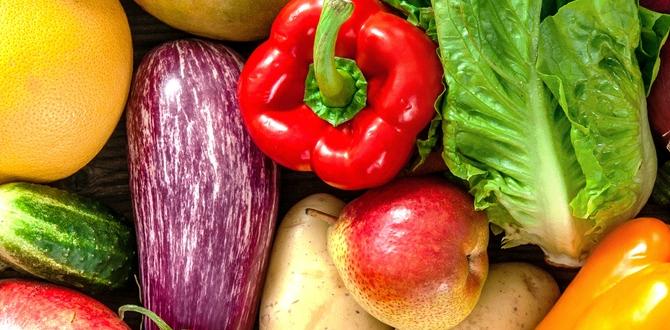
Vegetables for Raised Beds Gardening
Raised bed gardening is a fun way to grow your vegetables. You can plant easy options like tomatoes, carrots, and lettuce. These veggies thrive in the warm soil of raised beds, ensuring better yields. Did you know that raised beds also reduce weeds and make it simpler to care for plants? Imagine picking fresh tomatoes right in your backyard! Start with a mix of colorful vegetables to make your garden exciting and tasty.Benefits of Raised Bed Gardening
Improved soil drainage and aeration. Easier access for planting, maintenance, and harvesting.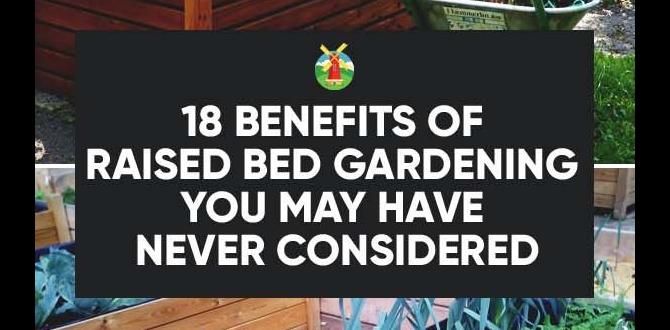
Raised bed gardening comes with some awesome perks! First, it improves soil drainage and aeration, allowing your plants to breathe easier. No more soggy roots! It also makes planting and harvesting a breeze. With raised beds, you won’t feel like you’re doing yoga while digging in the dirt. Instead of bending over, you can stand tall and feel like a garden superhero!
| Benefit | Description |
|---|---|
| Soil Drainage | Helps prevent waterlogged roots. |
| Access | Easy to plant and harvest without bending over. |
Choosing the Right Vegetables for Raised Beds
Factors to consider: climate, space, and sunlight. Selecting vegetables based on growth habits: compact vs. sprawling.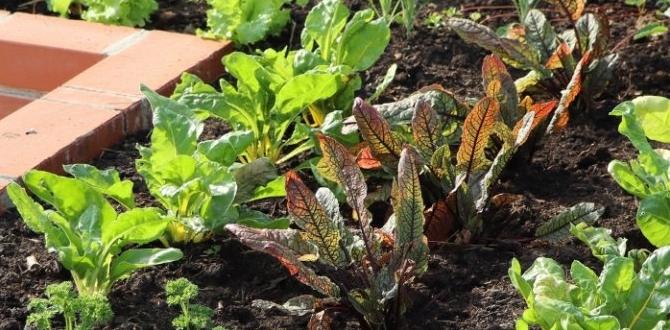
Picking the right vegetables for raised beds is fun! First, check your climate. Some plants need warmth, while others grow in cooler weather. Think about your space too. Compact plants fit well together, while sprawling ones need more room. Don’t forget about sunlight. Most veggies love the sun! Here are some examples:
- Tomatoes: Great for sunny spots!
- Lettuce: Prefers some shade.
- Carrots: Compact and easy to grow.
- Squash: Needs lots of space to spread.
Choosing wisely will help your garden thrive!
What vegetables grow well in small spaces?
Vegetables such as lettuce, radishes, and herbs like basil are great for small spaces. They are compact and easy to care for!
Factors to consider when selecting vegetables:
- Climate: Know if your area is hot, cold, or mild.
- Space: Measure how big your raised bed is.
- Sunlight: Observe where the sun shines in your yard.
Top Vegetables for Raised Beds
List of nutrientdense vegetables that thrive in raised beds. Recommended vegetables for different seasons: spring, summer, and fall.
Planting vegetables in raised beds can lead to a bountiful harvest. Here’s a list of nutrient-dense vegetables that grow well in raised beds:
- Spinach – Thrives in early spring.
- Carrots – Great for both spring and fall.
- Tomatoes – Best planted in summer.
- Radishes – Fast-growing, perfect for spring.
Different seasons offer unique choices. Choose the right vegetables for your raised beds to enjoy healthy, delicious produce!
What are the best vegetables for raised beds?
The best vegetables for raised beds are spinach, carrots, tomatoes, and radishes. Each thrives in different seasons.
Companion Planting in Raised Beds
Benefits of companion planting: pest control and growth enhancement. Examples of compatible vegetable pairings for raised beds.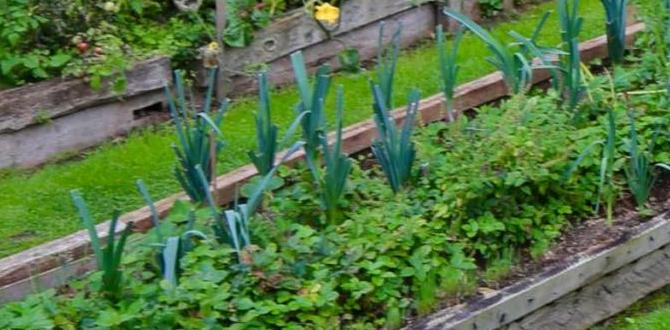
Planting certain vegetables together can help them grow better and keep pests away. This practice is called companion planting. For example, tomatoes thrive with basil. Basil can help repel flies and mosquitoes. Also, carrots and onions make great neighbors. Onions keep pests away from carrots! Here are some pairs to consider:
- Tomatoes and Basil
- Carrots and Onions
- Corn and Beans
- Radishes and Cabbage
Companion planting can lead to healthier plants and a better harvest. Isn’t that great? It’s like having little buddies in the garden!
What is the benefit of companion planting?
The main benefits of companion planting are effective pest control and improved growth. Plants help each other thrive and protect against harmful pests.
Soil Preparation and Fertilization
Importance of soil quality in raised bed gardening. Best organic fertilizers and soil amendments for healthy vegetables.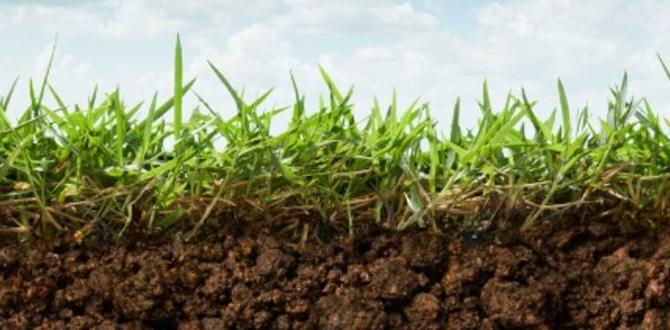
Soil quality is very important for raised bed gardening. Good soil helps vegetables grow strong and healthy. It holds water and nutrients well, which makes plants happy. To improve your soil, consider using organic fertilizers and a few soil amendments. Here are some great options for your garden:
- Compost: Boosts nutrition and improves soil structure.
- Worm Castings: Adds beneficial microbes and nutrients.
- Bone Meal: Supplies phosphorus for strong roots.
- Wood Ash: Adds potassium and raises soil pH.
These additions will help nurture your vegetables and increase your harvest.
What are the best fertilizers for raised bed gardening?
Some of the best fertilizers for raised bed gardening include compost, fish emulsion, and well-rotted manure.These options are natural and safe for your plants. They also improve the soil over time, making your garden even better each year!
Watering Techniques for Raised Beds
Effective watering strategies to maintain soil moisture. Importance of mulch for water retention and weed control.Proper watering keeps your plants healthy and happy. Use a drip irrigation system or soaker hoses to deliver water directly to the roots. This method saves water and time. Mulch is very helpful too. It locks in moisture and stops weeds from growing. By adding a layer of mulch, you can reduce the need for constant watering. Remember, healthy soil leads to strong plants!
What are the best watering techniques for raised beds?
Choosing the right watering technique is key. The best methods include: drip irrigation, soaker hoses, and hand watering. These techniques help keep your soil moist without wasting water.
Benefits of Using Mulch
- Retains soil moisture
- Prevents weed growth
- Controls soil temperature
Common Pests and Diseases in Raised Bed Gardening
Identification of common pests affecting vegetables. Organic solutions for pest and disease management.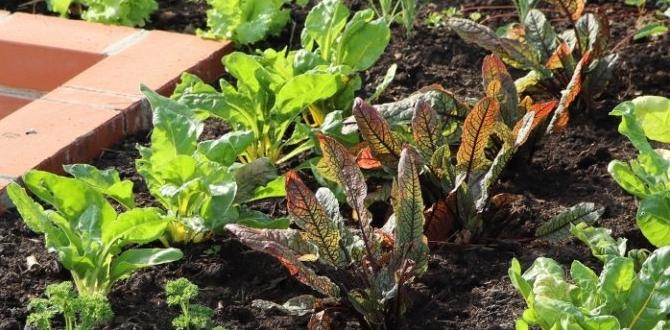
Pests can be tricky in raised bed gardens. Common pests include aphids, caterpillars, and whiteflies. They chew on plants and can cause damage. It’s important to spot them early!
To handle pests, you can use organic methods. Try these:
- Mix water with dish soap and spray the plants.
- Use neem oil to repel insects.
- Encourage ladybugs; they eat aphids!
Watch your plants closely. Healthy habits keep your garden thriving!
How can I identify common pests in my garden?
Look for tiny bugs on leaves or spots on fruits. Aphids are small and green. Caterpillars leave holes in leaves. Knowing these signs helps you act fast.
What are some organic solutions for pest management?
You can use natural sprays, like soap and water. Neem oil works well, too! Planting flowers can attract helpful insects.
Harvesting and Storing Vegetables from Raised Beds
Tips for knowing when to harvest different vegetables. Best practices for storing fresh vegetables to prolong shelf life.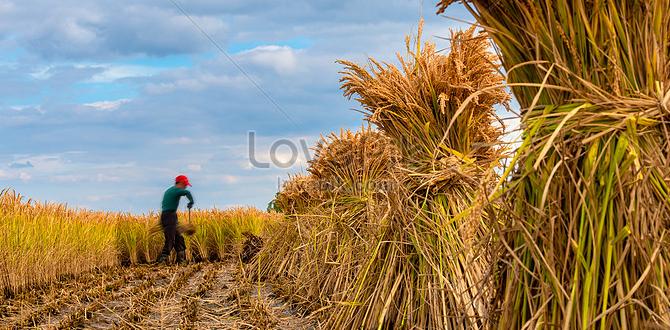
Harvesting vegetables at the right time is key. Each vegetable has a specific harvest time. For example, carrots are ready when they are about 1 inch thick. Check leafy greens like lettuce when leaves are big enough to eat. Storage is just as important. Keep vegetables in a cool, dark place. Use breathable bags for better air flow. Here are tips to help:
- Store potatoes in a paper bag to let them breathe.
- Keep tomatoes on the counter, not in the fridge.
- Put carrots in water in the fridge for freshness.
When are vegetables ready to harvest?
Check color, size, and feel. Beans should be firm and green. Peppers turn bright and shiny when ready. Inspect each vegetable often.
Conclusion
In summary, growing vegetables in raised beds is fun and rewarding. You can control soil quality and save space. Choose your favorite veggies like tomatoes, peppers, or carrots. Remember to water regularly and check for pests. Start your own raised bed garden today! For more tips and ideas, check out gardening books or online resources. Happy gardening!FAQs
What Are The Best Vegetables To Grow In Raised Beds For Optimal Yield And Ease Of Maintenance?Good vegetables to grow in raised beds are tomatoes, lettuce, and carrots. These plants grow well and are easy to take care of. You can pick fresh food right from your garden! They also produce a lot of yummy food in a small space. Remember to water them regularly for the best results!
How Can I Improve The Soil Quality In My Raised Beds For Healthier Vegetable Growth?To improve the soil quality in your raised beds, you can add compost. Compost is made from old plants and kitchen scraps. It adds vitamins to the soil. You should also mix in some garden soil to make it richer. Lastly, watering the soil regularly helps keep it healthy for your vegetables.
What Are Some Effective Strategies For Companion Planting In Raised Bed Gardening?Companion planting means growing different plants together that help each other. You can plant tomatoes with basil because basil keeps bugs away. Try planting carrots with onions; the onions can keep the carrot flies away. We should also make sure plants have enough space to grow, so they don’t crowd each other. Always remember to water your plants and give them sunlight!
How Do Seasonal Changes Affect The Choice Of Vegetables To Plant In Raised Beds?Seasonal changes tell us what vegetables to plant. In spring, we can grow seedlings like tomatoes and peppers. In summer, we should plant quick-growing veggies like lettuce and beans. In fall, we can get ready for cold with hardy plants like spinach. Winter is a time for rest, but you can plan for next spring!
What Are Common Pest Issues In Raised Bed Gardening, And How Can I Manage Them Organically?In raised bed gardening, you might see pests like aphids, slugs, and beetles. To manage them without chemicals, you can use soap and water to wash them off. You can also plant herbs like basil and mint that keep pests away. Another fun idea is to attract birds or beneficial bugs that eat the bad pests!
{“@context”:”https://schema.org”,”@type”: “FAQPage”,”mainEntity”:[{“@type”: “Question”,”name”: “What Are The Best Vegetables To Grow In Raised Beds For Optimal Yield And Ease Of Maintenance? “,”acceptedAnswer”: {“@type”: “Answer”,”text”: “Good vegetables to grow in raised beds are tomatoes, lettuce, and carrots. These plants grow well and are easy to take care of. You can pick fresh food right from your garden! They also produce a lot of yummy food in a small space. Remember to water them regularly for the best results!”}},{“@type”: “Question”,”name”: “How Can I Improve The Soil Quality In My Raised Beds For Healthier Vegetable Growth? “,”acceptedAnswer”: {“@type”: “Answer”,”text”: “To improve the soil quality in your raised beds, you can add compost. Compost is made from old plants and kitchen scraps. It adds vitamins to the soil. You should also mix in some garden soil to make it richer. Lastly, watering the soil regularly helps keep it healthy for your vegetables.”}},{“@type”: “Question”,”name”: “What Are Some Effective Strategies For Companion Planting In Raised Bed Gardening? “,”acceptedAnswer”: {“@type”: “Answer”,”text”: “Companion planting means growing different plants together that help each other. You can plant tomatoes with basil because basil keeps bugs away. Try planting carrots with onions; the onions can keep the carrot flies away. We should also make sure plants have enough space to grow, so they don’t crowd each other. Always remember to water your plants and give them sunlight!”}},{“@type”: “Question”,”name”: “How Do Seasonal Changes Affect The Choice Of Vegetables To Plant In Raised Beds? “,”acceptedAnswer”: {“@type”: “Answer”,”text”: “Seasonal changes tell us what vegetables to plant. In spring, we can grow seedlings like tomatoes and peppers. In summer, we should plant quick-growing veggies like lettuce and beans. In fall, we can get ready for cold with hardy plants like spinach. Winter is a time for rest, but you can plan for next spring!”}},{“@type”: “Question”,”name”: “What Are Common Pest Issues In Raised Bed Gardening, And How Can I Manage Them Organically?”,”acceptedAnswer”: {“@type”: “Answer”,”text”: “In raised bed gardening, you might see pests like aphids, slugs, and beetles. To manage them without chemicals, you can use soap and water to wash them off. You can also plant herbs like basil and mint that keep pests away. Another fun idea is to attract birds or beneficial bugs that eat the bad pests!”}}]}







